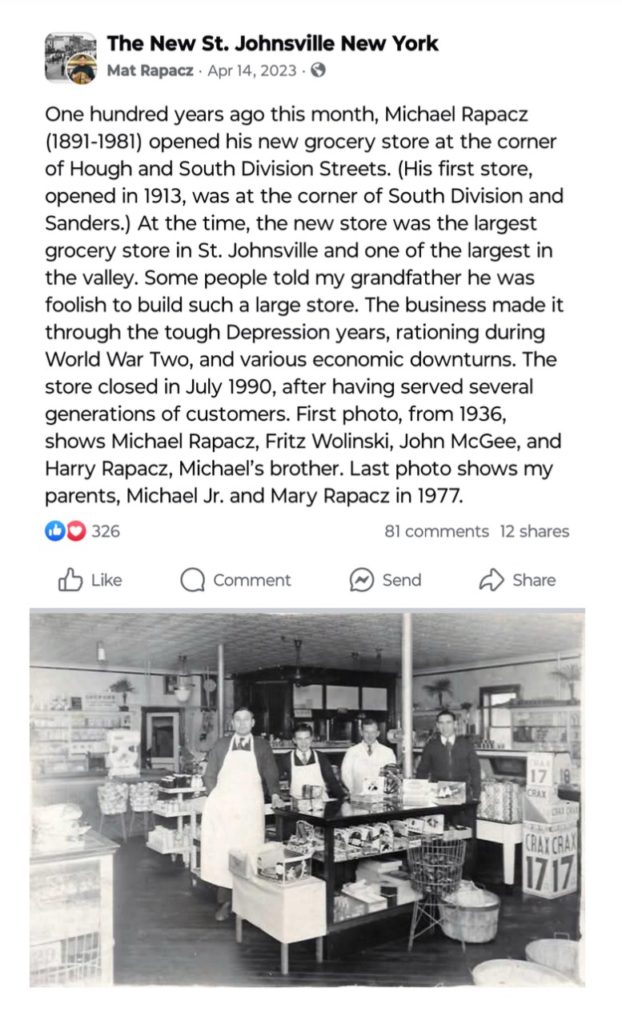How Does the Decline in Newspapers Effect Us?
By Cheyenne Dorsagno
Newspapers are more than a citation of daily goings-on – they’re tools for personal recordkeeping and civic responsibility.
But with the decline in newspapers, the public is disadvantaged.
Former journalist Mat Rapacz worked for the Evening Times newspaper of Little Falls, which he left after they reduced the number of general reporters from three to two. He then did some freelance writing for the Courier-Standard-Enterprise, which ceased publication a few years ago.
Now, as a municipal historian in St. Johnsville, Mat sees firsthand how the absence of newspapers affects both daily awareness and long-term memory.
The country is losing two newspapers a week, according to the Local News Initiative. And as newspapers decline, we’re losing artifacts – clues that help us piece together history, the blueprint for our current and future lives.

Source: Flickr.com, “Press Conference”, via Wiki Commons
And currently, without newspapers, the public isn’t educated on what’s happening in their own communities.
“They aren’t informed,” said Mat.
For starters, newspapers have been known to cover local government meetings about zoning, schools, public safety, transportation, and housing – things that impact our daily lives. If we aren’t in the know, then important decisions get made without our input.
“There’s virtually no coverage of that,” said Mat. “We’re missing a lot of things. There’s a news vacuum.”
Yet people likely see newspapers as obsolete, because we’re surrounded by an abundance of information on a daily basis.
“Internet information – often just opinion – is a poor replacement,” said Mat.
So, social media can give us a false sense of awareness. Because of what’s missing, but also because of what’s incorrect. It’s a timeless obstacle; how do we determine what sources are credible? Even if we verify one source’s credibility, that’s just the beginning. We should consider various sources to get a beginning idea of the truth.
As said by Philip L. Graham, former editor of the Washington Post, “News is the first rough draft of history.”
It’s recommended that you start learning from a newspaper, because they’re supposed to have a sense of due diligence in uncovering the truth. But you shouldn’t end the venture for truth there.
In a time of purported “fake news” and “alternative facts”, people wonder, why even bother with the news?
Well, we’ve all heard of “checks and balances”. Newspapers are a force in political accountability, transparency, and engagement.
And remember, it doesn’t end with newspapers. We shouldn’t forget that other government officials (other than the president) are part of the system. Even our local representatives! They serve as a familiar point-of-access for our voices to be heard.

Description: Local Government
Source: Wiki Commons
Being informed empowers us to advocate for ourselves.
It’s an enormous, ongoing undertaking that newspapers have simplified for the public.
“A good newspaper is a nation talking to itself,” said Arthur Miller, American playwright and essayist best known for plays like “Death of a Salesman” and “The Crucible”.
Ideally, journalism is a collaborative process in which a skilled writer uses their craft and integrity to bridge the gap between experts and “regular” people. Experts are interviewed and their events are covered, so we hear from them. The public is interviewed and they write Letters to the Editor, so they hear from us.
This attempt to arrive on the same page is best done in real time. In this relationship, newspapers capture contemporary public sentiment. With daily discipline, an authentic insight isn’t tainted by hindsight (for better or worse).
And take note that today’s news coverage is largely focused on national news, making our lives seem small, irrelevant, and powerless.
“There’s more than enough national news,” said Mat.
Keep in mind that most big issues start as local problems. For example, you may have noticed your neighborhood’s barriers to affordable housing – rising interest rates, reduced housing stock, slowing construction, increasing costs, etc. This is part of a nationwide trend, and your locality is a data point in the Harvard Joint Center’s annual report on The State of the Nation’s Housing.
Conversely, national epidemics can manifest uniquely in different localities. For example, during the COVID-19 pandemic, counties varied on mask mandates, vaccine accessibility, business survival, and hospital-bed availability.
We can feel the impact of local news, and we ourselves impact local news. It’s all history in the making.
But mind you, history isn’t simply what happened. It’s a record that attempts to tell the story of what happened.
As a historian, Mat often draws on newspaper archives to tell those stories, conduct research for public inquiry, and give insight into the past.
Historians provide a public service that’s regarded as a right. A historian is granted to every municipality in NYS, as mandated by law.
“All the historians I know are very happy to help people,” said Mat.
Historians aid the public in shedding light, fueling creativity, inspiring patriotism, retaining wisdom, honoring contribution, and understanding identity.

Description: Historians
Source: four images via Wiki Commons
So, newspapers have sentimental value too.
People reach out to historians for scrapbooking or memorial projects, and in this case, newspapers can come in handy. I remember being featured in a newspaper as a speaker at a college conference. Suddenly, it felt like I was doing something that mattered. And after I interviewed my boyfriend (when we first met), he picked up many copies of his article for safe-keeping. Sometimes, we’re so focused on a select-few “important” people that we forget that we matter too.
The obituary remains as one of the most popular segments in a newspaper by helping families grieve and by celebrating the lives of those lost. An obituary highlights the subject’s accomplishments, their personality, the family that carries on their legacy, and the organizations that supported their causes.
Additionally, newspapers cover events that define local culture. Consider Utica’s Taste of Lebanon food and entertainment festival.
Thankfully, Mat’s still doing his part writing. He carves a window pane through which readers can glimpse into culture’s past. Check out his stories on Little Falls Historical Society’s website and on Mohawk Valley Museums. He’s offered insight on an old local movie palace, a traveling circus, a basketball pioneer, and more.
If you’re worried about your legacy getting lost as journalists decrease, then you can start recording your own history.
But what should people record?
“Whatever they think is important in their own lives and the lives of their families,” said Mat.
 For inspiration, consider Mat’s historical flashbacks on The New St. Johnsonville New York Facebook page.
For inspiration, consider Mat’s historical flashbacks on The New St. Johnsonville New York Facebook page.
For perspective, Mat often gets inquiries about events, crimes, dates, loved ones, etc. Some particular bits of research that he’s done have led to grant funding to protect historic buildings. He’s also made various discoveries: the building a couple bought was St. Johnsville’s first auto dealership (in 1912), growing ginseng was once very profitable for local farmers, and a guy in Connecticut traced the history of his old truck back to St. Johnsville.
Clearly, you never know what details of your life will later be savored by others. But you can start by recording your milestones, your point-of-view on what’s happening in your community, and more. Some people use their social media as something of a scrapbook, but you may want to seek an archivist to make your story more secure and accessible. Then, you may have someone like Mat keeping watch over your keepsakes, as he takes inventory on the items in Margaret Reaney Memorial Library in St. Johnsville.
In fact, newspapers sort of started social media with their Society pages in the nineteenth century. According to Newspapers.com, Society pages reported on social events, family news, birthday parties, anniversaries, and more!

Source: The Clay Center Dispatch, 09/07/1887 via Newspapers.com
In order to do your part for your community, for history, and for newspapers at large, you can start by reading your local publications! Write a letter to the editor. Place your ads with them. Bring a large crowd to a local event so it’s more “newsworthy.” Just do your little part.
About Cheyenne Dorsagno

Cheyenne Dorsagno
Cheyenne Dorsagno believes that every life has stories worth telling. The more focused and “smaller” the story, the more it reflects the universal human experience. This belief shapes her personable writing tone and her deep love for her locality — in and around Utica, NY. Cheyenne writes about people who make their mark (quietly or boldly) on the world around them. A seasoned journalist and Summa Cum Laude English graduate from SUNY Oneonta, she’s devoted to celebrating what makes our short time here matter. You can follow her on LinkedIn or Facebook, and you can learn more about her services as a Legacy Ghostwriter at ourneighborhood.blog.


 The Rice Homestead, Mayfield Historical Society
The Rice Homestead, Mayfield Historical Society